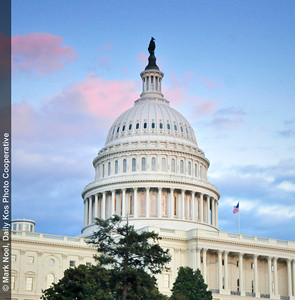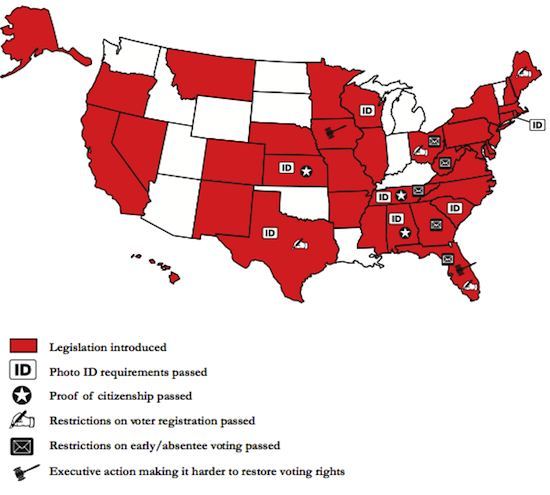
• CT-Sen: Just as you'd have suspected, Linda McMahon has a commanding lead in the GOP primary over Chris Shays, in the follow-on section to the general election poll PPP released last week. The wrestling mogul leads the ex-congressman by a crushing 60-27 margin, with Vernon Mayor Jason McCoy at 3. In a test with ex-Rep. Rob Simmons in the mix as well, things barely change: McMahon is still dominant at 54, with Shays at 19 and Simmons at 15. This is good news for Team Blue, since Shays is the most electable Republican option.
Meanwhile, the Democratic primary looks a lot more interesting, with Rep. Chris Murphy leading ex-SoS Susan Bysiewicz by 39-33 margin, while state Rep. William Tong is back at 8. That's an improvement for Murphy from PPP's March numbers (in a poll conducted on behalf of Daily Kos), which had him up just 40-38. (Tong hadn't yet entered the race.) Murphy has by far the best profile among Democrats, who view him favorably at a 49-19 clip. That's down a bit from the 51-14 mark he posted in the earlier survey, but Bysiewicz dropped further, to 38-30 from 45-27. Tong is at just 6-25.
Senate:
• MA-Sen: The second poll in a row, this one by Princeton Survey Research, shows an extremely tight race in Massachusetts in the general election — and another blowout by Elizabeth Warren in the Democratic primary. Click the link for our full post at Daily Kos Elections. Meanwhile, Rep. Niki Tsongas became the first member of the state's congressional delegation to endorse Elizabeth Warren's Senate bid. I'll be curious to see how the rest of the gang proceeds from here.
• MO-Sen: Three's company: Businessman John Brunner, who first mooted a run all the way back in April (sheesh), finally decided to get into the race to challenge Sen. Claire McCaskill. But first he'll have to get past Rep. Todd Akin and ex-Treasurer Sarah Steelman in the Republican primary — no small task, even if he is capable of at least some self-funding.
Gubernatorial:
• FL-Gov: Sayeth Tom: Rick Scott "no longer holds the dubious distinction as the most unpopular Governor PPP has polled on in 2011 — Ohio's John Kasich edges him out for that with a 53% disapproval rating." That's because Scott has soared from a 33-59 job approval rating to 36-52.
• KY-Gov: Dem Gov. Steve Beshear's already improbably lead has managed to grow improbably larger in SurveyUSA's newest poll. Click the link for the full details at Daily Kos Elections.
• MS-Gov: Using next month's gubernatorial race as a hook, where Democrats have nominated African-American Hattiesburg Mayor Johnny DuPree, this interesting New York Times piece delves into the extremely racially polarized voting that has become the norm in Mississippi. Thanks to the state's black population (proportionally the largest of any in the union), Dems these days generally start out with a floor of about 40%... and a ceiling not much higher. The article also suggests that the few remaining strongholds of white Democrats (mostly in northeast Miss.) are soon to disappear, with Republicans making persistent appeals to conservative local officeholders to switch sides.
• WV-Gov: Yow. In case you missed it, PPP's final poll of today's special gubernatorial election shows Republican Bill Maloney catching up on Dem Gov. Earl Ray Tomblin and turning the race into a last-minute tossup. Click the link for the full numbers at Daily Kos Elections.
House:
• CA-30, CA-26: Rep. Henry Waxman is trying to head off the looming primary battle in the 30th CD between fellow Democratic Reps. Brad Sherman and Howard Berman. Waxman wants Sherman to run in the incumbentless 26th District instead, but it doesn't sound like a winning move. The seat is much redder than the 30th and would mostly be new faces for Sherman. He'd wind up facing either GOP Rep. Elton Gallegly or if Gallegly retires (a very good possibility), another strong Republican. While an intra-party duel with Berman isn't a pleasant prospect either, Sherman needs to win that fight just once; even if he won the 26th next year, he'd always have to worry about GOP challenges in the future.
• GA-10: Former Republican Rep. Mac Collins, who used to represent the 8th CD, says he's thinking about a comeback — in the form of a primary challenge to Paul Broun in the redrawn 10th. The 10th now includes Collins' home, and according to the linked article, about half of it is new to Broun. I also think the outsider Broun, who doesn't seem to have cultivated strong establishment ties, is a pretty good target for this kind of venture. Collins left Congress in 2004 after losing the GOP Senate primary that year; he attempted to return in 2006, narrowly losing to then-Rep. Jim Marshall. Interestingly, Collins beat Broun once before, in the Republican primary for what was then the 3rd CD in 1992.
• IL-08: Tammy Duckworth just announced that she raised $386K in the third quarter of the year, though no word on her cash-on-hand. I'll be really curious to see what Raja Krishnamoorthi, her rival for the Democratic nomination, pulls in.
• IL-17: Former state Rep. Mike Boland, who has been running for the redrawn 17th District, has also picked up petitions for a state Senate bid. Boland apparently isn't circulating these petitions, and has been weirdly cagey about what he's even doing with them, but given how crowded the congressional field is, dropping down would make sense. The problem is that the Senate seat he'd run for (the 36th District) is already occupied by fellow Democrat Mike Jacobs. But that may not be an obstacle, since Boland and Jacobs are described as "political rivals."
• IN-08: Patrick Scates, a one-time staffer for Brad Ellsworth who had been considering the race, says he will indeed join what is becoming a fairly crowded Democratic field. In addition to Scates, Warrick County Democratic Chairman Terry White and former state Rep. Dave Crooks are all looking to take on GOP freshman Larry Buchson, who succeeded Ellsworth last year.
• NY-13: According to Jon Lentz at City Hall News, national Democrats are pushing would-be challengers to GOP freshman Mike Grimm to get in the race now, and not to wait for redistricting. That makes sense, since the election is only thirteen months away, and only the Lord of Maps knows when we might see new congressional lines for New York state. It sounds like the DCCC in particular wants to see some warm bodies in time for the candidate training session it's apparently conducing in DC later this month.
Also, in addition to the names known to be weighing a run, Lentz adds that Assemblyman Michael Cusick is considering the race, even though he said earlier this year that he wasn't interested. Cusick looked at this seat back in 2008, after Vito Fossella announced he'd retire, but declined to make a bid.
• OR-01: Republican Rob Cornilles said he raised upwards of $500K over the last two months, since entering the special election to replace ex-Rep. David Wu. No word on his cash-on-hand, or any totals from any of the three Democrats seeking the seat. Reminder: The primary is on Nov. 8 and the general election is Jan. 31 of next year.
• PA-04: Rep. Jason Altmire just announced that he raised $375K in the third quarter and has about $700K cash-on-hand. It'll be very interesting to see what fellow Dem Rep. Mark Critz raises, since the two men are widely expected to get thrown together in redistricting.
Redistricting Roundup:
• NY Redistricting: I always like seeing the work of DKos Electioneers recognized in other outlets, especially when it comes to redistricting. So it's cool that our own twohundertseventy (aka Rasmus Pianowski) got some column inches in the New York Daily News for his vision of what a court-drawn state Senate map might look like. You can check out his proposal here. Nicely done.
• OH Redistricting: Ohio Democrats filed a lawsuit in the state Supreme Court last week, asking for a determination as to whether they can seek to have the new congressional redistricting map placed on the ballot for a referendum. If you've been following this whole saga, you'll recall that Republicans attached a budgetary appropriation to the bill, in an attempt to immunize it from going before voters. At least one legal expert thinks that these GOP shenanigans won't succeed, pointing to a 2009 high court ruling which said that in the case of "mixed" bills like this one, only the appropriations parts are safe from repeal.
• UT Redistricting: Even though Gov. Gary Herbert is reportedly unhappy with the congressional plan his fellow Republicans in the legislature have settled on, state Senate President Michael Waddoups says: "I think’s there’s about a 98 percent chance that what you see now will be the near to the final maps." Meanwhile, the chair of Utah's Democratic Party is pledging a lawsuit over the maps for an interesting reasons. Jim Dabakis says that Waddoups has argued that the last set of redistricting plans from a decade ago must have been fair because no one ever sued — so Dabakis wants to make sure he can rob Waddoups of that talking point in the future. As to the merits, it sounds like there's nothing beyond a hopeless partisan gerrymander claim.










